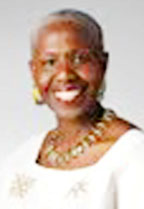Carolyn Cooper is Professor of Literary and Cultural Studies at the University of the West Indies, Mona, Jamaica. In the 1980’s, she was an active member of the Women’s Studies Working Group at Mona. She also contributes a column to the Jamaica Gleaner newspaper. A version of this essay appeared in the Gleaner on Sunday February 20.
By Carolyn Cooper
This month it’s black history; next month it’s women’s history. Women, like black people, now get a whole month in which to celebrate our collective contribution to world culture. What a ‘poppyshow’! Like black history, women’s history really ought to be everyday history. But it is not.

In most societies, it is men who make history. And men also write or speak history. So, naturally, men are the prime subjects of history. Women end up on the margins or are completely written out of the story. So we women – especially black women – still have to put up a fight to insert ourselves into history.
Last week Sunday, ‘mi head tek mi’ when I saw the poster for the conference on “Collective Responsibility for the 21st Century” jointly hosted by CARICOM, the University of the West Indies and the Commonwealth Secretariat. I simply couldn’t believe it. The advertisement featured eleven men. Not even one token woman! Nor a single young man. The combined age of those poster patriarchs for CARICOM and the UWI had to be no less than 700 years! Not quite Methuselah, but still. The face of Caribbean regional integration was completely male and totally old.
I immediately sent off a despondent email to head office: “I despair for our university and the region: The flyer for the conference features 11 men! Is there not one woman whose face can be used to advertise the conference? Are any women slated to speak? I would very much appreciate seeing the full programme. Was there a call for papers sent out for this conference? Or is this a closed shop?
At this very late stage, I’m offering a paper for the panel on “People-Centred Development”: “Representations of Caribbean Regional Integration in Jamaican Popular Culture.” It would be based on my essay published in Caribbean Imperatives: Regional Governance and Integrated Development. I’ve copied this email to the vice-chancellor but just in case he doesn’t see it, I would appreciate your bringing my concerns to his attention.”
Appalling gender ratio
I got an apologetic response. The Prime Minister of Trinidad and Tobago, Kamla Persad-Bissessar, had been invited to be the keynote speaker but she couldn’t come after all. And most of the other women who had been asked to participate declined for one reason or another. The gender ratio of speakers was appalling; 23 male: 2 female.

I was offered the option of chairing the panel on “People-Centred Development”, which I graciously declined. I was settling for nothing less than giving a paper. My persistence paid off and I was allowed to speak on the panel, “Regional Integration: Commonwealth Perspectives.” But I felt as if I’d committed a rapacious act. Forcibly penetrating the programme. Why couldn’t a call for papers have been issued so that potential participants, both male and female, could have felt free to offer their contribution?
That’s the nature of patriarchy. Privilege is not readily surrendered. The authority to invite participation guarantees complete control of the agenda. Of course, my being permitted to speak confirms the fact that patriarchy can afford to be indulgent while still holding on to absolute power. Indeed, my insistent recommendation that another, younger female scholar be invited to chair the panel I’d been offered was disregarded.
Against my explicit wishes, my name appeared on the programme as chair of the panel on “People-Centred Development.” Resigned to my role, I decided to not look a gift horse in the mouth. In my capacity as moderator, I took the opportunity to elaborate my dismay at the patriarchal politics of the conference.
More than three decades after the path-breaking ‘Women in the Caribbean Project’, headed by Professor Joycelin Massiah; and more than a decade and half since the establishment of the regional Centre for Gender and Development Studies at UWI, women were still being marginalised in a most vulgar way.
The flyer advertising the conference, as well as the gross gender imbalance in the selection of speakers, was a slap in the face of Caribbean women and perceptive men who fully understand the need to undermine patriarchy. This kind of psychological violence can be even more destructive than physical abuse.
Men ‘run tings’
These days, when I hear that tired story about the gender ‘imbalance’ between male and female students at the University of the West Indies, especially at Mona, I just kiss my teeth. I know that gender imbalance is not a problem at the higher reaches of university administration. Men still ‘run tings’ at the University of the West Indies.
It is true that a few token women have been appointed as administrators. But do they really challenge patriarchy? Or are they complicit with the system? For example, the post of Deputy Principal seems to be reserved for women: close enough to power but not really in the driver’s seat.
It was the calypsonian Penguin who mischievously proposed that “a deputy essential to keep you feeling vital.” If women keep settling for deputy we will certainly ensure the continued vitality of patriarchy.
Quite frankly, I was most surprised that the female Deputy Principal who addressed the topic “The Politics and Economics of Gender in Regional Integration and Development” did not speak in any fulsome way about the gender politics of the conference itself. But, perhaps, it was not politic to do so.
I keep wondering when the patriarchs at the University of the West Indies will relinquish their hold on power – if ever. Mouthing gender equity and setting up a regional Institute on Gender and Development Studies is no substitute for what is actually needed: a radical transformation of gender relations that will allow the best ‘man’ to rise to the top. Even if it’s a woman.
An astute male colleague brought to my attention the delicious irony that only three of the four UWI Campus principals were represented on that now infamous conference flyer. I myself was so vexed I didn’t even notice that the principal of the Open Campus, who happens to be a woman, was excluded from the portrait of the Old Boys’ Club! This speaks volumes about how the fledgling Open Campus is perceived: decidedly peripheral.
And is it by accident or design that the most marginal (and impoverished) of the UWI campuses is headed by a woman?
Post-Commonwealth?
In my paper on “Representations of Caribbean Regional Integration in Jamaican Popular Culture” I highlighted George Lamming’s rejection of the identity of ‘West Indian’. In The Pleasures of Exile, published in 1960, Lamming declares: “I refrain from saying that I am from the West Indies, for it implies a British colonial limitation. I say, rather, I am from the Caribbean, hoping the picture of French and Spanish West Indies will be taken for granted.”
Lamming’s identification with the multi-lingual Caribbean affirms an immediate regional affiliation beyond the ironically narrow ambit of the British Commonwealth. Emancipating himself from the mental slavery of historically defined colonialist identities, Lamming claims a new language to name himself.
Indeed, language – both literal and symbolic – is a primary means through which regional integration is manifested; for example, the language of music.
Hybrid musical forms such as socareggae, chutney soca, dancehall soca, reggaezouk, reggaeton have emerged out of the wide circulation of popular culture in the entire Caribbean region.
While academics and politicians keep on talking in circles to each other about their ‘top down’ models of regional integration, the people of the Caribbean are happily ‘wining’ to a common beat.
